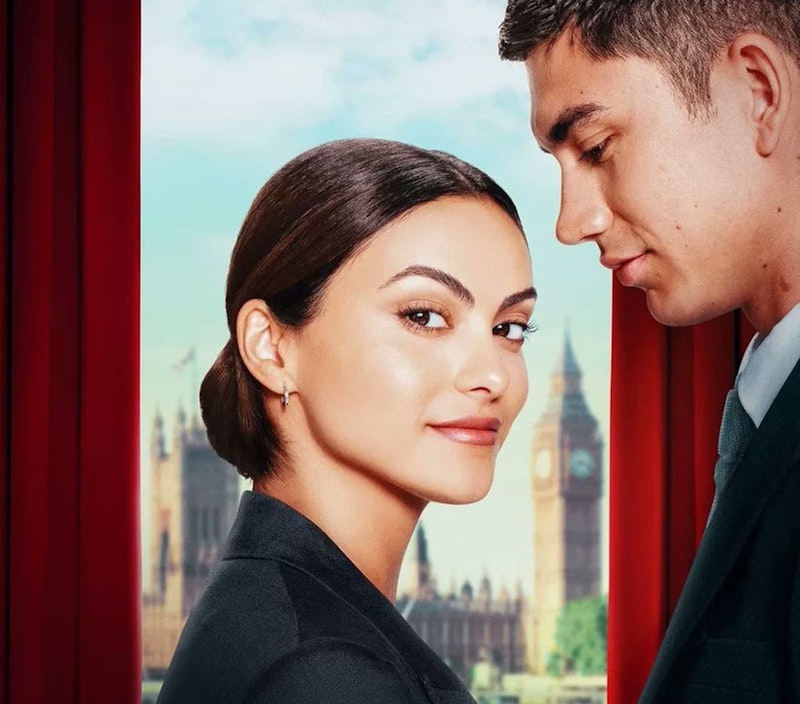Romance narratives from Jane Austen and Charlotte Brontë on have been obsessed with class at least as much as love. But the 19th-century English obsession with fine distinctions of financial status has largely dropped away. Our society has huge inequalities, but they’re downplayed or finessed. Billionaires like Elon Musk and millionaires like Tucker Carlson claim to speak for the working class; everyone’s supposed to nod along and pretend that massive wealth inequalities don’t really affect how you live or who you are. Where’s the romance in that? Director Carlson Young’s new Amazon Prime film Upgraded has a brilliant answer. The class, and therefore the romance, is at the airport.
The movie’s meet cute twist is arranged at LaGuardia’s booking counter. Ana (Camila Mendes), a dead-broke assistant at Erwin art dealership, is ordered to travel to London at the last minute by her boss Claire (Maria Tomei). Claire’s other assistants bully Ana so mercilessly while getting tickets that the airline clerk takes pity on her and upgrades her to first class. As a result she ends up sitting next to wealthy scion William (Archie Renaux)—and when he mistakes her for her successful and wealthy boss, she doesn’t correct him.
Being upgraded turns Ana into a different, wealthier, more glamorous person. That’s the promise of romance, in which some prince or billionaire is always swooping in to fit the heroine with the right shoe and transform all their pumpkins into chariots.
Nowhere is the pumpkin-to-chariot pipeline more vividly present than at air travel transportation hubs. Especially since deregulation in the 1980s and 9/11 gave us permanent security theater, the airport experience has turned into a parodic ritual of hyper-capitalist dystopia. Everything’s for sale. You’ve got luggage? Great—as long as you pay more to check it. Don’t want to stand in an endless line waiting for your flight? Great! You can pay to bypass it. If you want to sleep while you wait for your flight, there are lounges—for a price.
And once you’re on the plane, there are seemingly millions of gradations of comfort and discomfort available for your lucre. Slightly more legroom in the emergency exit row? Want to sit with your small children? Want to travel in actual comfort, without your knees in your ears? You can pay for it all—and if you can’t pay, you can see just how lucky and comfortable the richer half is.
The airplane’s a miracle, not of travel, but of class consciousness. Small and large distinctions in income sit just feet away, as vivid and inescapable as the cramp in your back. The sad sacks in coach can twist, groan and gaze longingly at the first-class passengers with their mixed drinks and their legroom just as Austen’s Elizabeth gazed with longing at Darcy’s beautiful grounds at Pemberley.
Upgraded understands that link between envy, desire and daydream, and it capitalizes on the way that the distance between that seat over there and this seat over here can feel, mid-flight, like the difference between your own mundane scrounge and the glitter of your hopes. The rest of the movie can’t really live up to that insight. Ana and William have to get off the plane and onto the plot, with its more or less entertaining art world machinations and moral about how being someone you aren’t is fun but ultimately bad, even if it kind of gets you everything you want. Attractive people wear attractive outfits; everyone gets a happy-ever-after except for the people who don’t deserve one. If you hate fluffy romcoms, you’ll hate this. If you enjoy them, you could do worse.
But you have to admire the way Upgrade grasps its baggage, steps up to the ticket counter, and recognizes Cinderella standing there and hoping for a fairy godmother. Airports take you places. But they also put you in your place, reminding you, with a condescending chair to the knee that the greatest distance in the world is between those who have money and the rest of us.

